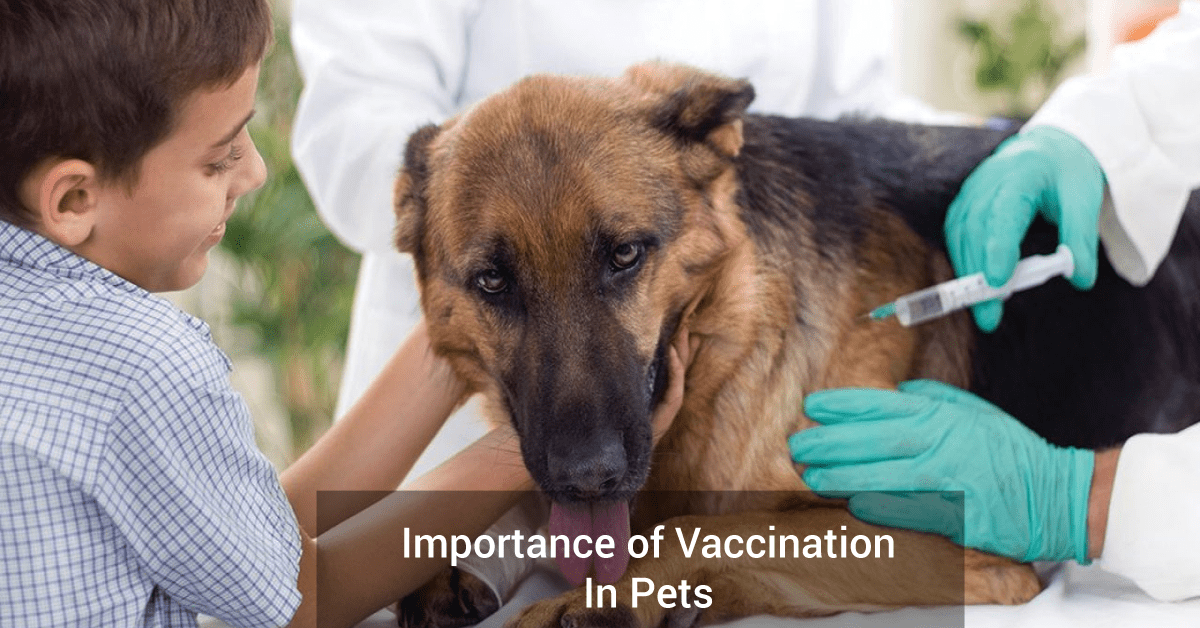Vaccination helps the pet stay immune to diseases that can otherwise be life-threatening. You must consult a vet once you decide to get a pet home, so that the vet can suggest the appointment dates of the vaccinations accordingly.
Vaccines are the most effective way to prevent disease in pets. They help protect against the infectious agents that can cause diseases. When an animal is vaccinated, its immune system gets stimulated to recognize and attack the disease-causing agent that helps protect the animal from the disease, which could otherwise be life-threatening.
The benefits of vaccination go far beyond just preventing disease symptoms—the antibodies produced by immunization last a lifetime, and your pet will benefit from being protected against disease for its entire life. On the other hand, a pet that isn’t vaccinated against common diseases is at risk for serious illness, painful injections, and even death. Therefore, it’s essential to keep your pet up to date with its vaccinations so it can enjoy a long and healthy life.
The American Animal Hospital Association (AAHA) recommends annual vaccination for dogs and cats against the following: rabies, distemper, hepatitis, parvovirus, adenovirus, leptospirosis, coronavirus, and virus-associated leukemia (VAL). Some vaccines are recommended for specific conditions like rabies and cat-scratch disease (CDV).
Vaccination is one of the most effective ways to protect your pets against disease, with vaccination rates as high as 90% in some areas. The diseases your pet can be vaccinated against depending on the area they are kept in, so it is essential to make sure your pet is vaccinated against the correct diseases in their local area.
Vaccines for animals are of two types:
Core and Non-Core vaccines:
Core Vaccines:
Core vaccines are a must for all pets based on the risk of exposure, the severity of disease, or transmissibility to humans.
For Dogs: Vaccines for canine parvovirus, distemper, canine hepatitis, and rabies are considered core vaccines.
For Cats: Vaccines for panleukopenia (feline distemper), feline calicivirus, feline herpesvirus type I (rhinotracheitis), and rabies are considered core vaccines.
Non Core Vaccines:
Non-core vaccines are administered on the dog’s exposure risk. These include vaccines against Bordetella bronchiseptica, Borrelia burgdorferi, and Leptospira bacteria.
Non-core vaccines are given depending on the cat’s lifestyle; these include vaccines for the feline leukemia virus, Bordetella, Chlamydophila felis, and feline immunodeficiency virus.
Your veterinarian will let you what vaccines are best for your pet.
What is the right time to vaccinate your pet?
For puppies: Puppies should receive vaccinations starting at six to eight weeks of age. A veterinarian will administer a minimum of three vaccinations at three- to four-week intervals. The final dose will be administered at 16 weeks of age.
Adult dogs: Adult dogs should receive certain vaccines annually, while other vaccines might be given every three years or longer.
Kittens: When the kitten is around six to eight weeks of age, your veterinarian can begin to administer a series of vaccines at three- or four-week intervals until the kitten reaches 16 weeks of age.
Adult cats: Adult cats might be revaccinated annually or every three years.
It advised that puppies and kittens should stay with their mother for least eight weeks of age as the mother’s milk gives them antibodies to fight diseases
From what diseases does vaccination help animal pets?
Vaccination is a way to protect your animal pets from disease. It helps animals build up immunity to certain diseases. For example, vaccines can protect animals from infectious diseases such as rabies, distemper, and feline leukemia. Vaccines can also help protect animals from cancers and other diseases caused by the environment, such as cancers caused by radiation or chemicals.
Vaccines help protect our pets against a wide range of diseases. They can help pets avoid getting sick, but they can also have a protective effect even when a disease isn’t actually caught. This is known as “vaccine immunity” or “vaccine-induced immunity.” Vaccine immunity occurs when your pet receives a vaccine for a disease but doesn’t contract the disease because the vaccine causes the animal’s body to produce antibodies that fight off the disease.
Vaccinations help protect animal pets against a variety of diseases. Vaccines for pets protect against common diseases like canine parvovirus, feline leukemia, and rabies, as well as the less well-known but sometimes deadly panleukopenia and rotavirus. They are designed to prevent the animal from contracting certain diseases.
Vaccinate now
Vaccination is critical for the well-being of your pet and saves you the trauma of dealing with a very sick pet. Vaccination should begin early and continue through the life of the pet as advised by the veterinarian. Read the article for more information on vaccination schedules of your pet and connect to a veterinarian online



